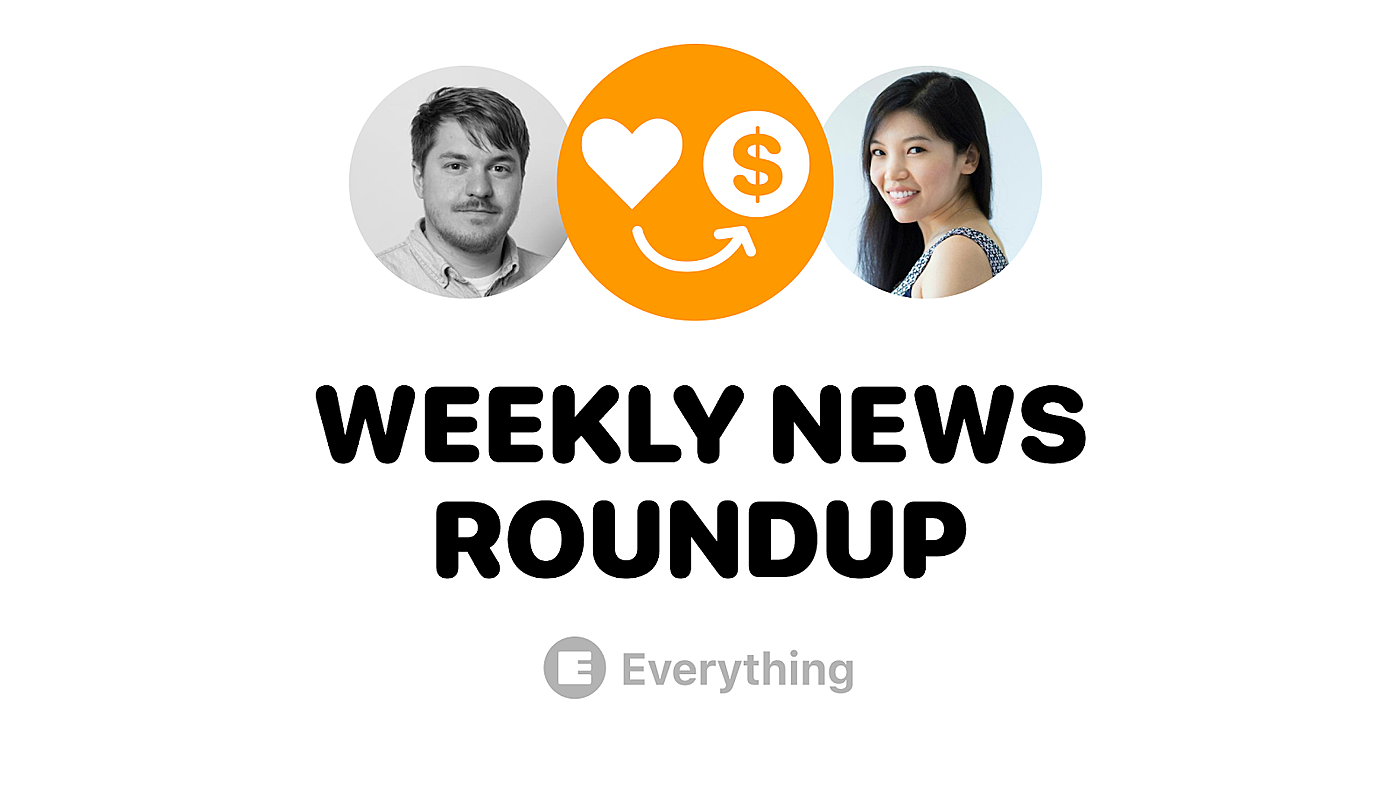
Welcome to Issue #7 of the Means of Creation weekly news roundup where we break down the latest news on the passion economy, including the happenings related to platforms, creators, startups, and trends.
This Week’s Interview: Joe Albanese
This week we interviewed Joe Albanese, CEO and cofounder of Stir, a startup that’s building tools to help creators run their businesses and optimize their finances.
Last week, Stir launched a public beta of its core product and also announced its $4 million seed round led by Homebrew, XYZ Capital, and Ludlow Ventures, with participation from Casey Neistat, Jack Conte from Patreon, and our own Li Jin.
Some highlights from our conversation with Joe:
- The backstory on how he ended up building for creators and major learnings so far
- Why collaborations between creators (“collectives”) are important in the passion economy
- Why they’ve been creating Drops
Find it as a podcast on Apple Podcasts, Spotify, Overcast, Breaker or wherever you listen to podcasts, or as a video on YouTube here. Or subscribe to the Means of Creation YouTube Channel.
Top of Mind
Glenn Greenwald Goes Independent
Glenn Greenwald resigns from the Intercept following dispute over Biden story // Jeremy Barr & Elahe Izadi, Washington Post
TLDR:
- Glenn Greenwald, cofounder of the Intercept, resigned over editorial disagreements related to a story that portrayed Joe Biden in a critical light.
- The Intercept, a popular publication known for its investigative journalism, first came into the spotlight for breaking Edward Snowden’s story.
- Like many high-profile writers with loyal audiences, he chose Substack to launch his independent newsletter. A migration that was personally lauded by Substack cofounder Chris Best.
- Chris Best on Twitter: ""As of now, I will be publishing my journalism here on Substack" 🔥… "
So what?
- Editorial autonomy seems to be the common motivation driving prominent writers to leave their established media jobs. Substack seems to be the common platform.
- With this influx of established writers, questions around Substack’s own editorial identity have been raised. Unlike a neutral intermediary, are there certain sociopolitical narratives that Substack leans towards?
- Myles Udland on Twitter: "I think Substack's editorial identity is starting to come into focus."
- Moreover, an overly romanticized narrative of editorial independence dismisses the role editors have traditionally played. Editorial checks and balances arguably protect us from disinformation.
- Elizabeth Spiers on Twitter: "I say this as a former editor who had to run things by lawyers: making an ethically and legally sound decision not to publish disinformation is not censorship by your editor."
- Recommended Read: My Resignation From The Intercept // Greenwald, Substack
Shopify and TikTok Join Forces
TikTok partners with Shopify on social commerce // Sarah Perez, TechCrunch
TLDR:
- Shopify announced an integration with TikTok releasing a slate of cross-platform features. Shopify merchants will be able to create native ‘in-feed shoppable video ads’ giving them a direct channel to their customers through TikTok.
- An integration with TikTok Pixel will also help them keep track of key campaign metrics.
So what?
- Social commerce is powerful: people are 90% more likely to trust and buy from a brand recommended by a friend. Notably, the Shopify and TikTok integration stops short of letting content creators monetize their commerce-related content, and is focused on shoppable ad units for merchants in the feed. This move doesn’t go as far as other shoppable video startups we’ve seen recently, like The Lobby or Popshop Live, which give content creators a way to sell products directly to their audiences.
- Today, the primary way that TikTok creators monetize commerce intent is through brand partnerships (e.g. Charli D’Amelio and Dunkin). We’re waiting with bated breath to see more native commerce options roll out, which today is present in Douyin, the Chinese version of TikTok.
- Merchandising can be a substantial revenue stream for creator-led businesses as illustrated by Linus who runs popular YouTube Channel Linus Tech Tips. Perhaps in the future, we can also expect a virtual store that creators can own in the app (akin to Tmall).
Nursing Students Use OnlyFans Out of Necessity
These Nursing Students Are Turning To OnlyFans To Get Through The Pandemic // Otillia Steadman, Buzzfeed News
TLDR:
- This piece profiles nursing students who are using OnlyFans to cope with dire financial conditions.
- Pandemic induced job-cuts have left several individuals searching for alternative ways to make ends meet. “‘For a lot of the people [...] sex work is not necessarily their only occupation, or the main occupation even, it’s this emergency source of informal income that they can get when they’re in a bind.’”
- The article notes several examples of women who’ve joined OnlyFans during the pandemic who view the platform as a temporary stop-gap, as well as a nursing student who plans to continue even after getting her degree.
So what?
- Even though OnlyFans is often spoken of as a creator platform, in many cases, creators’ presence on the platform is catalyzed by grim financial realities in their lives.
- OnlyFans brings up interesting questions around what companies are even included in the passion economy umbrella. Li’s definition of the passion economy includes platforms that are creating a path for individuals to monetize through non-commoditized skills. This begs the question, does OnlyFans emphasize or commoditize individuality? What is the line between passion vs. necessity? One of Li’s friends suggested that perhaps the truest passion-based jobs are ones that people would still engage in even if there were universal basic income (which is a high bar).
- A few weeks ago, we debated the limitations of the term “passion economy” in our conversation with Taylor Lorenz, who argued that many people engaging in this new economy aren’t doing it out of choice, but necessity. That may be truer than ever during the pandemic as traditional job paths disappear.
- Recently, there’s also been news of the pandemic’s disproportionate toll on women: 865K women left the US workforce in September, which is 4x more than men. This is due to a combination of factors: women being more represented in jobs adversely affected by the pandemic, as well as from bearing the bulk of housework and childcare. New platforms that enable women to work on their own terms—around their schedules, from home—could be an answer for how to make work more inclusive.
ICYMI
A Controversial Profile On Hot Pod founder Nick Quah
How Nick Quah Became the Podcast Whisperer // Rob Walker, Medium
- Rob Walker, a senior writer for Marker by Medium wrote a controversial profile on Nick Quah, founder of podcasting industry newsletter Hot Pod. The original piece was titled “How a Malaysian Immigrant In Idaho Became the Go-To Expert On Podcasting” which was subsequently renamed. The profile also uses phrasing such as “random guy” multiple times.
- As the number of individuals monetizing their individuality increases, their group identity — and lack of an institutional background to function as a traditional badge of credibility — may arbitrarily be used to discredit them. How will independents establish credibility in the future? Is it just through the trust of their audience or will we see increased collaboration and bundling to transfer trust?
- Recommended Reading: wtf re: that nick quah profile // Deez Links, Substack
Newsletter OS Launch
Newsletter Operating System (Notion Dashboard) // Janel, Gumroad
- Janel, writer of BrainPint and SaaS Investing Digest launched Newsletter OS, a Notion dashboard with tools and resources that helps writers curate, write and grow their newsletters.
- The dashboard is priced at $39 and contains resources such as expense trackers, subscriber monetization tips, pre-drafted email templates, and more.
- The rising number of independent newsletter writers do not possess the editorial and publishing resources legacy media publications have. Newsletter OS is a precursor to the inevitable rise of organizations that help independent writers with these needs.
Candidates Paying Influencers for Political Posts
From Facebook to TikTok, U.S. political influencers are paid for posts // Elizabeth Culliford, Reuters
- The growing use of political influencers has been spurred by aggressively campaigning parties ahead of the presidential elections.
- While celebrities have impersonal social capital over a large section of society, micro influencers have trust based social capital over a smaller, but more dedicated group.
- This reaffirms a trend we previously covered. The trust based call-to-action of political micro influencers is much more potent compared to generic ones by big name celebrities.
Substack Rankings
This edition compares Oct 27 to Nov 3.
- Glen Greenwald (as discussed at the beginning of this newsletter) rose to the 7th spot after not being on the charts last week.
Passion Economy Financings
- Cinnamon raised a $2.5 million seed round led by micropayments platform Coil. The company is trying to simplify the creator payout infrastructure. Viewers pay $5/month to Coil and then Cinnamon distributes that pool of money to creators based on how much time viewers watch their content. There is one major limitation — these micropayments are only enabled if the creator and consumer are both using the Coil infrastructure.
- Shotcall raised a $2.2 million seed round led by Initial Capital, New Stack, and Lerer Hippeau. Shotcall is a platform that aims to increase engagement for streamers by giving their fans the opportunity to stream with them.
How did you feel about this post?
We read every piece of feedback!
The Only Subscription
You Need to
Stay at the
Edge of AI
The essential toolkit for those shaping the future
"This might be the best value you
can get from an AI subscription."
- Jay S.
Join 100,000+ leaders, builders, and innovators

Email address
Already have an account? Sign in
What is included in a subscription?
Daily insights from AI pioneers + early access to powerful AI tools








Comments
Don't have an account? Sign up!